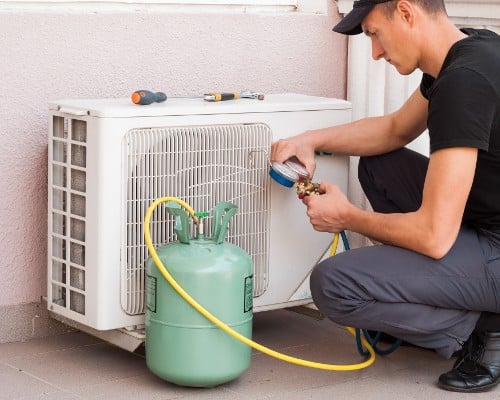As we bask in the summer heat, your air conditioner serves as your loyal soldier, fighting off the high temperatures to keep your home comfortable. But have you ever paused to consider how your AC achieves this cooling miracle?
If your air conditioner hasn’t been performing as it should, low freon levels could be to blame. We will walk through some telltale signs that indicate low freon in a central air conditioning unit to help ensure you remain cool and comfortable this summer.
So sit back, grab a cold drink, and let’s dive into this topic. Remember, the professionals at River Valley Air Conditioning are here to help with all your AC needs — call us anytime!
What is freon, and how does it affect your central air conditioner?
Freon, also known as Chlorofluorocarbons or CFC, is an odorless colorless gas commonly used as refrigerant in air conditioning units. Consider it your AC’s lifeblood; all its components rely on freon’s cooling power for proper functioning.
The role of freon is straightforward yet critical. When your AC is on, it absorbs the heat from the air indoors and transfers it outside, leaving your home’s interior cool and comfortable. Here’s where freon steps in. It begins its journey in a gaseous state, absorbing the indoor heat as it passes through the AC’s evaporator coil.
This heat transforms the freon from a low-pressure gas to a high-pressure liquid. This hot freon liquid then travels to the outside unit, where it releases the heat and cools down. It then returns to the indoor unit, and the entire process repeats.
Let’s visualize it with a simple example. Imagine you’re sipping a hot cup of coffee on a summer day, and the steam is making you feel hotter. Now, envision a magical sponge that can soak up all the heat from the steam, leaving the air around your coffee cup cool. This magical sponge is comparable to the freon in your AC unit.
Understanding this process is essential because if your freon levels are low, your AC won’t absorb heat effectively. This inefficiency can result in your AC unit running continuously, trying to cool your home without success.
An overworked AC could lead to increased energy bills and potential damage to your unit. Monitoring freon levels is essential to maintaining a comfortable home. At River Valley Air Conditioning, our experts are here to assist in this effort and keep your space cool and breathable.
6 Symptoms of low freon in your central air conditioner
Not sure how to tell if your AC is low on freon? Here are 6 telltale signs that your air conditioner may be experiencing this problem.
- Inadequate cooling: The most obvious symptom of low freon levels is inadequate cooling. If your air conditioner is running but not cooling your home effectively, it might be due to low freon levels. This is because freon is essential in absorbing heat from your home’s air, and a shortage would reduce its ability to do so.
- High energy bills: Low freon levels make it more difficult for your air conditioner to adequately cool your home, leading to an overworking unit and higher energy consumption, and rising bills.
- Ice buildup: Low freon levels may result in insufficient heat being absorbed by your evaporator coil, leading to condensation and freezing on its surfaces. If frost or ice formation appears on your evaporator coil, this could be a telltale sign that freon levels have dropped drastically and require replenishing.
- Warm air blowing from vents: When freon levels are low, your air conditioner might emit warm air through its vents as the freon cannot absorb enough heat to effectively cool it and circulate it back through your home through the vents.
- Hissing noise: Low freon levels might also be caused by a refrigerant leak, which can cause a hissing or bubbling noise. If you hear such sounds from your AC unit, it’s recommended to call a professional immediately, as refrigerant leaks can be harmful.
- Longer cooling cycles: Your air conditioner might take a bit longer than usual to reach the set temperature if freon levels are low. This is because the reduced heat absorption capability of the freon would prolong the cooling process.
Remember, if any of these symptoms arise, it’s advisable to consult a professional HVAC technician as soon as possible. River Valley Air Conditioning offers our expertise and assistance for maintaining an ideal home environment.
An inside look at diagnosing low freon levels
To understand how to tell if your AC is low on freon, HVAC professionals employ a variety of techniques. Initially, they will review the symptoms mentioned above, such as warm air output, prolonged cooling cycles, and unusual noises from the unit.
They may also use a special thermometer to measure the air temperature coming out of your vents. One of the more definitive methods involves attaching a set of manifold gauges to the service valves of the unit to check the system’s pressure, which will be lower than normal if freon levels are insufficient.
Refrigerator leak detectors may be utilized in certain scenarios to locate leaks that cause low freon levels. It’s imperative that this process is left to professionals, as the improper handling of this chemical can be dangerous.
Keeping your cool: The final word on freon levels and your AC
Understanding the signs and symptoms of low freon in your central air conditioning unit is crucial to creating an ideal living environment. Warm air, prolonged cooling cycles and unusual noises from your unit could all indicate low freon levels.
Professional technicians employ various techniques to identify low freon levels, such as checking air temperature and system pressure levels and using refrigerant leak detectors. Due to its potential dangers, handling freon requires special expertise – it is therefore recommended to trust this task exclusively to specialists.
River Valley Air Conditioning is here to assist. Don’t allow low freon levels to compromise your comfort – reach out today and allow our team of HVAC specialists to ensure your unit is operating at peak condition.

